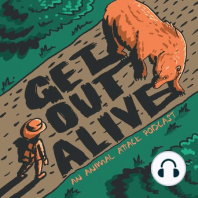46 min listen

Ep. 13.5: Polar Bear Interview with Danielle Rivet
Ep. 13.5: Polar Bear Interview with Danielle Rivet
ratings:
Length:
50 minutes
Released:
Nov 17, 2021
Format:
Podcast episode
Description
How common are polar bear attacks? How do people who live with polar bears feel about them? How do mother bears poison their cubs? How can you take part in polar bear research from your own couch? Learn the answers to all those questions and more with polar bear researcher Danielle Rivet!You can identify camera trap photos on Zooniverse with the Arctic Bears ProjectYou can track polar bears with Polar Bears InternationalAnd you can follow Danielle on Twitter @GrizzlyGirl87 and don't forget to check out her weekly Knock Knock Who's Bear posts!Follow us on Instagram, Facebook, and check out our website GetOutAlivePodcast.com and join us on Patreon!You can find Ashley at TheAngryOlogist on Twitter and Nick hates social media. Thanks for listening!Disclaimer: This is not professional advice; Follow at your own risk.Support the show
Released:
Nov 17, 2021
Format:
Podcast episode
Titles in the series (79)
Ep. 11: A Python's Prey (feat. Hiral Naik) by Get Out Alive: An Animal Attack Podcast